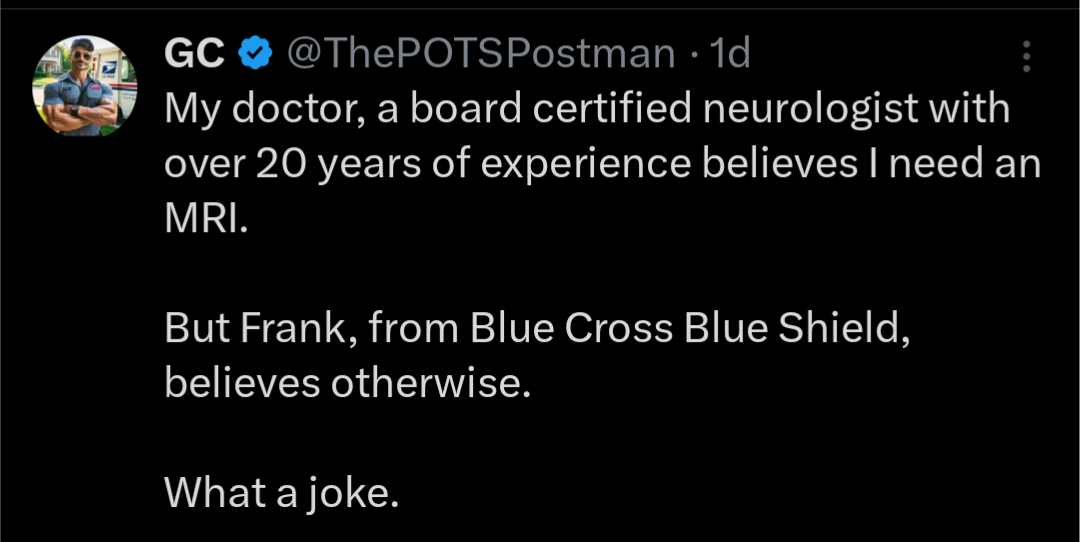this post was submitted on 07 Oct 2024
1928 points (99.3% liked)
Microblog Memes
6714 readers
2846 users here now
A place to share screenshots of Microblog posts, whether from Mastodon, tumblr, ~~Twitter~~ X, KBin, Threads or elsewhere.
Created as an evolution of White People Twitter and other tweet-capture subreddits.
Rules:
- Please put at least one word relevant to the post in the post title.
- Be nice.
- No advertising, brand promotion or guerilla marketing.
- Posters are encouraged to link to the toot or tweet etc in the description of posts.
Related communities:
founded 2 years ago
MODERATORS
you are viewing a single comment's thread
view the rest of the comments
view the rest of the comments

Yes, it's clear why it's legal and necessary to some extent. In a for-profit system, a doctor's office or hospital, every procedure or test the doctor can order (and have the patient pay for) will generate profit. Doctors have an incentive to order as many tests as possible. I assume that most doctors are somewhat honorable and won't abuse this too much, but they'll probably still err on the side of ordering as many tests as possible not necessarily because of profits, but because more tests gives them more information.
Meanwhile, in a for-profit system, an insurance company will generate the most profit by agreeing to as few tests and procedures as possible. So, they will have an adversarial relationship with doctors and will try to arrange as few tests and procedures as possible. My guess is that the average insurance company is less ethical than the average doctor, so they're probably more likely to refuse to allow tests that are actually medically necessary.
In a sane system, there would be a neutral referee, the government, who would resolve disputes and severely punish any actor in the system that was behaving badly. But, AFAIK that only rarely happens in the US, where the idea is that the "invisible hand of the free market" will magically make it all work.
Doctors do not directly profit from ordering tests. They get paid whether they order a test or not.
You want to know who profits from over testing? Quest Diagnostics.
https://bergermontague.com/quest-diagnostics-pay-1-79-million-settle-false-claims
These guys literally defrauded the government, but everyone points their fingers at poor people, doctors, liberals, ethnic minorities, lgtbq people, ect. The problem is corrupt businesses and their CEO's hoovering up as much money as they can so they can shove it up their ass.
This would conceivably be true for car repair as well. A mechanic is incentivized to order as many repairs as possible for a car.
So why don’t they?
The answer is many-faceted, but the main ones are (a) professional ethics, (b) reputation, and (c) second opinions which kinda feed into b.
Any provider whether doctor/mechanic/wedding photographer/whatever is also incentivized to serve their customers well by selling them only things that truly benefit them.
We don’t need insurance companies in all those other industries to prevent providers from using an infinite-billing hack to generate infinite money.
Great example, mechanics are notorious for ripping people off.
They do. Car mechanics have a notorious reputation for doing repairs that aren't necessary, or for breaking something so that the owner has to come in again soon.
Yeah, there's a natural counterbalance that means they don't want to be seen as dishonest. Similarly, an insurance company is counterbalanced against trying to prevent every test or procedure by also wanting to be seen as honest.
You're aware that car insurance is a thing right? Any industry where the charges are going to be extremely high is going to involve insurance. Cars are fairly expensive devices, and so there's car insurance, and if you're in a big accident your car insurance will pay for the repairs. But, the car insurance will keep an eye on you to make sure you're not committing insurance fraud, and also limit how much the car repair shops are allowed to spend to repair your car.